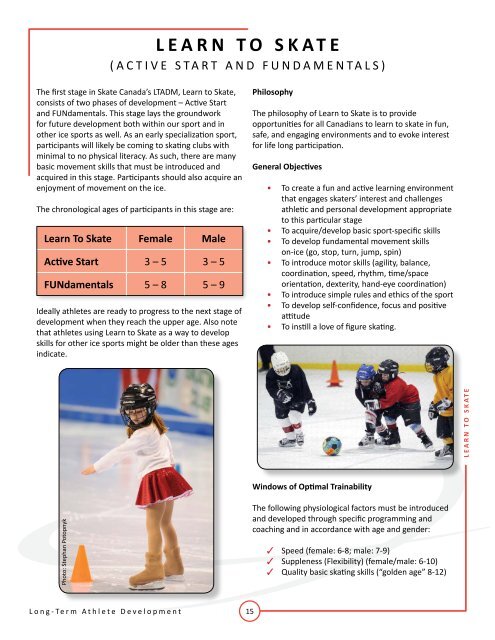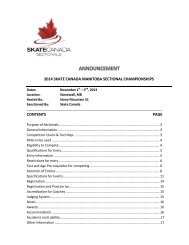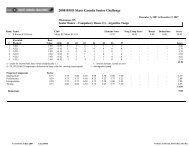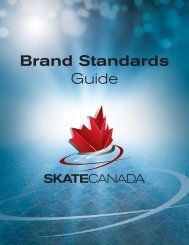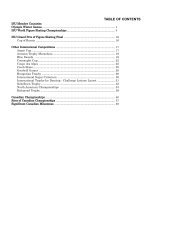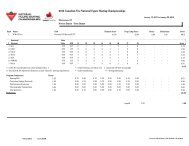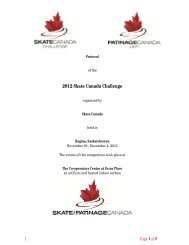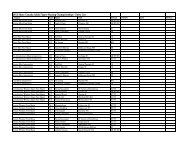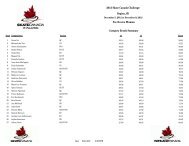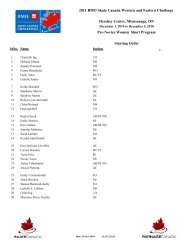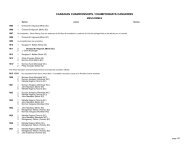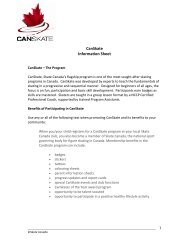LONG-TERM ATHLETE DEVELOPMENT - Skate Canada
LONG-TERM ATHLETE DEVELOPMENT - Skate Canada
LONG-TERM ATHLETE DEVELOPMENT - Skate Canada
Create successful ePaper yourself
Turn your PDF publications into a flip-book with our unique Google optimized e-Paper software.
The first stage in <strong>Skate</strong> <strong>Canada</strong>’s LTADM, Learn to <strong>Skate</strong>,<br />
consists of two phases of development – Active Start<br />
and FUNdamentals. This stage lays the groundwork<br />
for future development both within our sport and in<br />
other ice sports as well. As an early specialization sport,<br />
participants will likely be coming to skating clubs with<br />
minimal to no physical literacy. As such, there are many<br />
basic movement skills that must be introduced and<br />
acquired in this stage. Participants should also acquire an<br />
enjoyment of movement on the ice.<br />
The chronological ages of participants in this stage are:<br />
Learn To <strong>Skate</strong> Female Male<br />
Active Start 3 – 5 3 – 5<br />
FUNdamentals 5 – 8 5 – 9<br />
Ideally athletes are ready to progress to the next stage of<br />
development when they reach the upper age. Also note<br />
that athletes using Learn to <strong>Skate</strong> as a way to develop<br />
skills for other ice sports might be older than these ages<br />
indicate.<br />
Photo: Stephan Potopnyk<br />
L o n g - Te r m A t h l e t e D e v e l o p m e n t<br />
L E A R N T O S K A T E<br />
( A C T I V E S T A R T A N D F U N D A M E N T A L S )<br />
865 Sheord Road, Ottawa, Ontario K1J 1H9<br />
Phone 613.747.1007 I Toll Free 1.888.747.2372 I Fax 613.748.5718 I Toll Free Fax 1.877.211.2372<br />
15<br />
Philosophy<br />
The philosophy of Learn to <strong>Skate</strong> is to provide<br />
opportunities for all Canadians to learn to skate in fun,<br />
safe, and engaging environments and to evoke interest<br />
for life long participation.<br />
General Objectives<br />
• To create a fun and active learning environment<br />
that engages skaters’ interest and challenges<br />
athletic and personal development appropriate<br />
to this particular stage<br />
• To acquire/develop basic sport-specific skills<br />
• To develop fundamental movement skills<br />
on-ice (go, stop, turn, jump, spin)<br />
• To introduce motor skills (agility, balance,<br />
coordination, speed, rhythm, time/space<br />
orientation, dexterity, hand-eye coordination)<br />
• To introduce simple rules and ethics of the sport<br />
• To develop self-confidence, focus and positive<br />
attitude<br />
• To instill a love of figure skating.<br />
Windows of Optimal Trainability<br />
The following physiological factors must be introduced<br />
and developed through specific programming and<br />
coaching and in accordance with age and gender:<br />
3 Speed (female: 6-8; male: 7-9)<br />
3 Suppleness (Flexibility) (female/male: 6-10)<br />
3 Quality basic skating skills (“golden age” 8-12)<br />
L E A R N T O S K A T E


